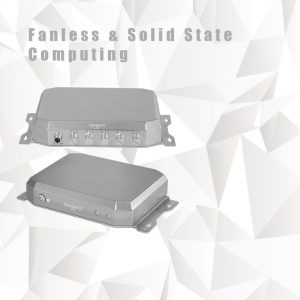Benefits of Fanless Computers
With durable, fanless construction, most of our Mini Rugged PCs provide quiet and reliable operation. Fanless computers are ideal for critical care environments, hospitals, nurseries, or anywhere that noise is a consideration. The primary function of a fan in a computer system is to cool down the internal components and prevent overheating. Fanless computers use alternative cooling methods and lower-powered components that give off less heat. The result, is computers that are silent and energy efficient. Most fanless computers are typically more compact like Mini PCs. In business settings, these qualities are often highly valued. Fanless computers can promote dust free environments, because without the presence of a fan there is no opportunity for dust to be collected and further distributed throughout the environment th. This quality is also beneficial in hospitals as it helps prevent the spread of airborne particles. Fanless computers are ideal for chip manufacturing facilities as they can help meet minimum requirements of dust per air ratios.
Silent Operation
The loudest part of a computer is typically the fan. When fans are removed and solid state hard drives are added, up to 99% of the audible noise is eliminated, Components such as solid state hard drives have no moving parts; making them inherently silent and reliable – the perfect partner for a fanless computer. A silent operating fanless computer is beneficial in a wide range of applications: libraries, laboratories. operating rooms, recording studios, or other environments where sound (or the limitation of sound) is critical.
Small Size
Many fanless computers are often designed to be compact. Without a fan, the need for air around components used for cooling is unnecessary. As such, the internal parts of the computer can be placed closely together without overheating. The small size of fanless computers allow them to be mounted in compact spaces making them ideal for offices. They are capable of fitting underneath desks and tables. When size is a consideration, a fanless computer can be an excellent choice.
Energy Efficient
A fanless computer is often built with energy efficiency in mind. No fans mean the computer components must waste little power and generate minimal heat. Therefore, fanless computers use less power and reduce energy cost. For businesses running a large number of computers simultaneously, fanless computers result in significant savings.
Reliability
Some Tangent fanless computers are compact and offer a sealed chassis making them more robust. Many fanless computers are rated for shock and vibrations making them suitable for in-vehicle applications. Fanless computers are often designed to withstand extreme temperatures or exposure to different elements. Fanless computers are not threatened by dust and moisture the way classic computers are. This equates to less maintenance and longer lasting durability. With fewer moving parts and internal connections the margin for malfunction is virtually eliminated in many applications including harsh environments.
